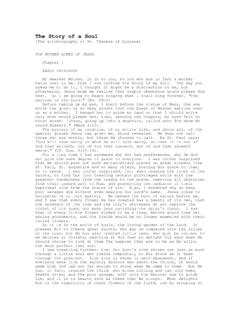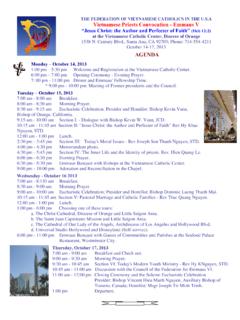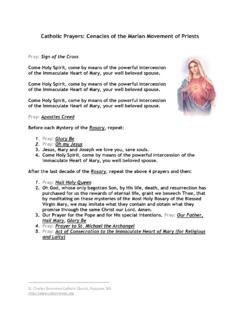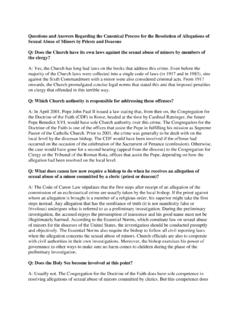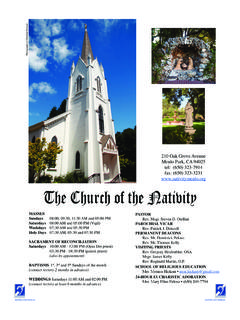Transcription of The Soul of the Apostolate - olmc-mission.org
1 (Note: this version has not yet been corrected for spelling and formatting according to the original published text. Feel free to send a message to the webmaster at to encourage this to be corrected as soon as possible.) The SOUL of the Apostolate By Dom Jean-Baptiste Chautard, DOM CHAUTARD A Biographical Note It is surely significant that the day on which the author of this modern spiritual classic, the Soul of the Apostolate , was born in the French Alps, was the feast of St. Gregory the Great, March 12, 1858. For it is one of the cardinal principles of St. Gregory s mystical and ascetical teaching that there exists an inseparably close relation between the so-called active and contemplative lives, so much so that though one may dominate over the other (and the most perfect state is that in which contemplation dominates) yet in the soul of anyone called by God to high sanctity the life is always essentially a mixture of contemplation (love of God) and action (love of neighbor).
2 Now it is precisely this problem which the brilliant and ardent Cistercian abbot of Sept-Fons, in central France sets himself to elucidate and discuss in this pamphlet, which has gone into many editions and hundreds of thousands of copies in many languages, and which was the bedside book of Pope Pius X. The reason why St. Gregory the Great was so perfect in expounding the relation of action and contemplation is that, called from the cloister to the Papacy in one of the crises in the history of the Church, he found out what that relation was in the crucible of trial and labor and distraction and struggle. And the reason why Dom Chautard has been able to write so well on the same theme for our own age, intoxicated with the confusion of its own sterile and purely worldly activities, is that he too was so often torn, by the hand of God, from the cloister, and made an instrument of Divine Power and Providence and Love to protect the monks and nuns of the Cistercian Order, and to call priests, religious, and layworkers in Catholic Action to a life of closer union with God, in Whom is the only principle of vital and effective social action: divine charity, won for us by the Sacrifice of Christ, His Incarnate Word, upon the Cross.
3 The Chautards ran a little bookshop, and the father of the future monk was one of those purely nominal Catholics who sometimes go to Mass, but whose principles are entirely vitiated by the materialistic and utilitarian views of the middle class to which they belong. The mother was in a different category. She had more faith, and she saw to it that her children were educated as Catholics. However, as their son grew into young manhood, neither he nor they had an idea of his entering religion. He went to Marseilles to study economics at the university, with a commercial career in mind. There was a relative in Chile. Perhaps the young man would join him and make a fortune there. The atmosphere of the University of Marseilles was scarcely Catholic, but in a footnote to one of the later sections of the Soul of the Apostolate , the author tells us how he was one day much affected by the simple devotion with which a priest was reciting his Breviary, and he began to ask himself why he did not pray more himself.
4 Soon he began to frequent a Catholic club, founded for the working and lower middle-class youth of the great Mediterranean port by the saintly Father Allemand. When Dom Chautard describes his experience of this really vital and supernatural brand of Catholic Action in the Soul of the Apostolate he is referring to a later visit to Fr. Allemand s club, after his ordination. But indeed it may be said that Dom Chautard s vocation, and the Soul of the Apostolate itself are both to be traced to Fr. Allemand s club, at Marseilles. If this youth-club had been one of those more or less timid compromises with modern notions that make so much Catholic Action seem like no more than a run by a couple of priests, Dom Chautard would have probably ended by exporting nitrates from Chile. But here he found something more than third-rate amateur dramatics and the atmosphere of a secular social club.
5 This was more than a tame and sheepish attempt to rival the attractions of the dance hall and the cafe by vainly trying to beat them at their own game of pleasing and entertaining human nature. There was something more, something that appealed to a much deeper and more urgent and more vital necessity: faith, supernatural charity, a deep and simple and unbreakable solidarity among souls united, as he was to discover, in Christ. And, as a result of all this, he began to taste that peace which the world cannot give. It was when he was kneeling in prayer, one day, in the chapel of the club, at the tomb of its saintly founder, that he received the grace of his vocation to religion. He countered the violent and embittered opposition of his father s bourgeois hatred of religious orders, by a barefoot pilgrimage up the stony Alpine roads to Our Lady s Mountain Shrine at aus, and in answer to his prayers, he was admitted as a postulant to the Trappist Abbey of Aiguebelle, near the Rhone, north of Avignon, in 1877.
6 Here he began to learn, with inexpressible joy, how to live the contemplative life as it had been practiced for centuries according to the Rule of St. Benedict and the Usages of the Cistercians. He began to live the life of a White Monk, that life of obscurity, obedience, silence, poverty, solitude, hidden in the secret of God s face, that is, of His presence and of His will. But it is above all, a life of ceaseless praise. Dom Gabriel, the abbot of this ancient monastery, was a friend of the great Benedictine Dom Gueranger and he stressed the liturgical character of the Cistercian life above all. That is one reason why a most valuable section of the Soul of the Apostolate is the one devoted to the liturgical life. Surely there is nothing more fundamental and nothing that is more closely interconnected with Dom Chautard s conception of Catholic Action as a reproduction of the life of the early Christians: and it was the earliest ages, especially the Patristic age, that were the most purely liturgical and, as we see from the writings of the Fathers, the fullest of pure charity, based on sacrifice, without which Catholic Action is a mockery.
7 But like so many White Monks before him, like St. Bernard and St. Peter of Tarentaise, Jean-Baptiste Chautard was not destined to taste for long the unmixed joys of contemplation. He was not yet solemnly professed, being still in the midst of his studies, and just ordained deacon, when Aiguebelle was faced with complete ruin. Dom Gabriel had had some opportunity to estimate the young monk s practical ability, since Fr. Jean-Baptiste had been serving for some time as guest-master. The abbot took the bold step of sending him to Paris to try and use his ingenuity to save his community. But all Fr. Chautard s native ability and eloquence and learning and economics proved useless. Finally he threw himself down in prayer at the shrine of Our Lady of Victories. When, a half hour later, he emerged into the street, a stranger came up to him saying: Are you not a Trappist? What brings you to Paris, Father?
8 Can I be of any assistance to you? The rest of the story can be guessed. Aiguebelle was saved. And Dom Chautard had his first real practical experience of the relative worth of natural activity, and activity aided by, and based on prayer. The rest of the story of his life is a catalogue of activities that might appall a member of the most active Order in the Church. After directing, as cellarer, the rebuilding of practically the whole monastery of Aiguebelle and the establishment of a chocolate factory there to provide a little revenue, he became abbot of Chambarand near Grenoble. After the reunion of the various Trappist congregations in 1892 he was commissioned by the Abbot General, Dom Sebastian Wyart, to see to the repurchase of the old Mother House of the Cistercian Order, Citeaux, which he bought and made ready for occupancy. When Dom Sebastian moved into the Mother House, one of the most important abbeys of the Order, Sept-Fons, needed a new abbot.
9 Dom Chautard was elected. He made use of his right to refuse, but when Dom Sebastian appealed to the Pope, Leo XIII expressed his desire that Dom Chautard accept, and he yielded to the will of God. Thus he became abbot of a house at once important and impoverished, and responsible for daughter-houses not only in France and Belgium, but in China, Japan, Palestine, and Australia. Soon he was to add another in Brazil. And the constitutions of the Order require that all such houses be often visited by their Father Immediate, though obviously he could not visit them all each year in person. In 1901, when one of the frequent attacks against the Church burst out again in France, Dom Chautard was chosen to represent the Cistercians of the Strict Observance in Paris. He put up such a good fight that Clemenceau, who was no friend of the Church, was nevertheless impressed with his sincerity and fearlessness, and the Order at large was spared.
10 Others were by no means so fortunate. During the First World War, besides his frequent visits to the monks who had been conscripted and sent to the front, Dom Chautard gave shelter at Sept-Fons to a community of Belgian Cistercians, another community from Palestine, the orphans from an asylum at Arras, and the inmates of an old men s home. At the same time, Dom Chautard added to this a much more important work of mercy in the spiritual order. A magazine for French priests, conscripted and sent to the front, directed by him, attained such popularity and influence that it was continued with even greater fruit in the difficult period of readjustment that followed the war s end. At that time, these priests, exposed to great spiritual dangers by the moral and physical disintegration which they had seen at such close range, and by the unsettled state of the society to which they returned, needed nothing so much as the consolations and medicine of a doctrine like Dom Chautard s, which placed the greatest emphasis on the one source of all our strength: God s grace, obtained in ever greater abundance by a life of prayer and mortification.
